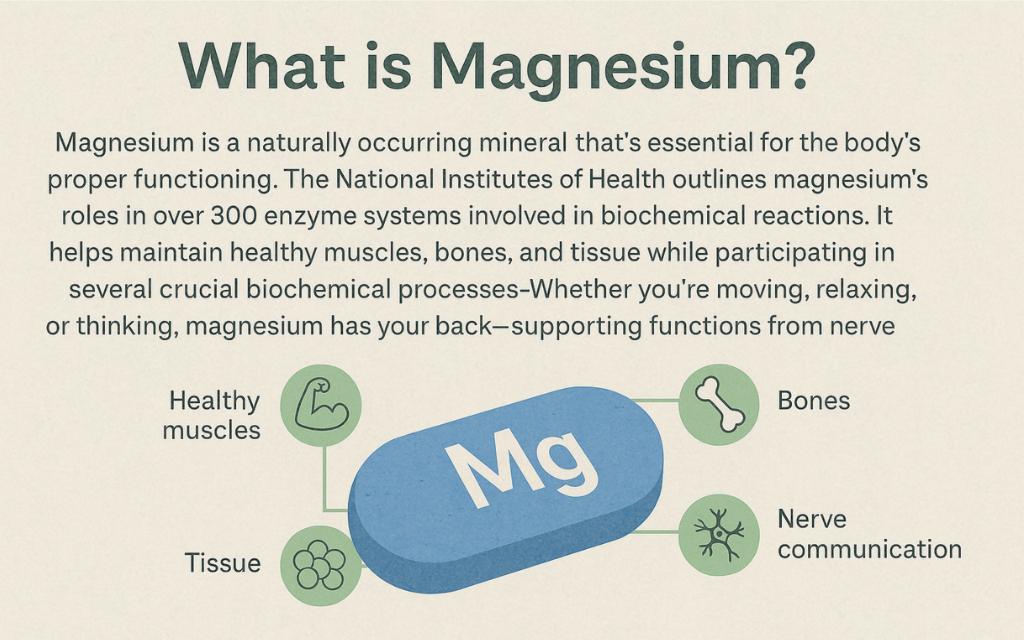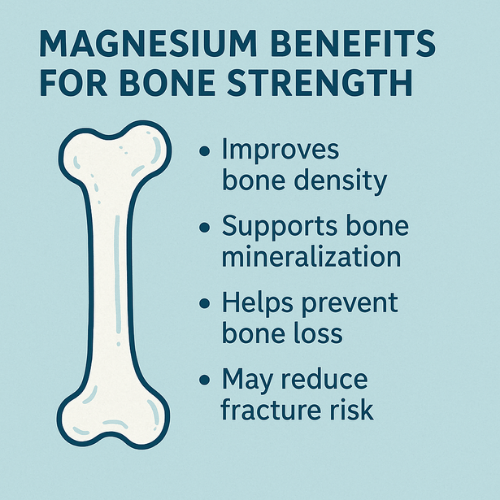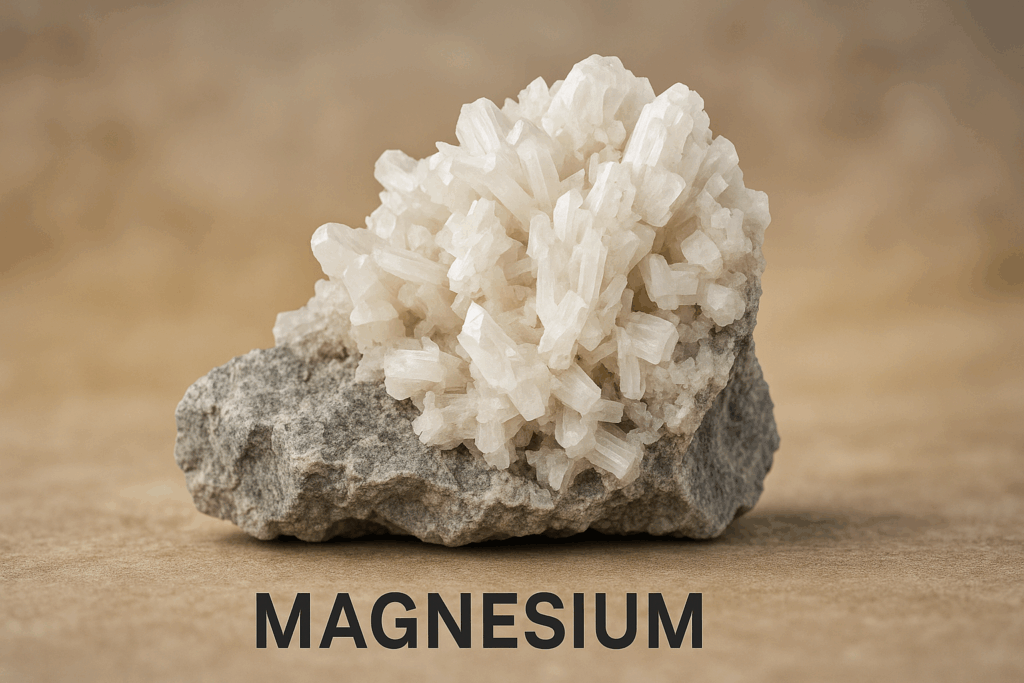Magnesium is a super mineral that plays a crucial role in your body’s daily functions. Found in your bones, muscles, and tissues, it’s involved in over 300 essential biochemical processes. From supporting muscle and nerve activity to strengthening the immune system, magnesium helps keep your body functioning at its best. However, despite its importance, many people fall short of their daily needs. In this article, we’ll explore the top magnesium benefits you shouldn’t ignore — and why getting enough of this powerful nutrient is key to your overall health.
Table of Contents
Introduction to Magnesium
What is Magnesium?
Magnesium is a naturally occurring mineral that’s essential for the body’s proper functioning. The National Institutes of Health outlines magnesium’s roles in over 300 enzyme systems involved in biochemical reactions. It helps maintain healthy muscles, bones, and tissues while participating in several crucial biochemical processes. Whether you’re moving, relaxing, or thinking, magnesium has your back—supporting functions from nerve communication to protein production.

Why is Magnesium Important for Your Body?
Magnesium is essential for managing and supporting numerous vital functions throughout the body. It helps control muscle and nerve function, regulate blood pressure, and maintain steady blood sugar levels. Plus, magnesium is key to protein synthesis, bone health, and even the creation of DNA! In short, magnesium is one mineral your body simply cannot function without, even though it’s often overlooked.
Benefit 1: Magnesium Benefits for Heart Health
Magnesium and Blood Pressure Regulation
One of the most important magnesium benefits is its positive impact on cardiovascular health. It helps regulate blood pressure, which is crucial for preventing hypertension (high blood pressure). Magnesium works by relaxing blood vessels, promoting smooth blood flow, and lowering the risk of heart disease. If you want to keep your heart in tip-top shape, magnesium is your friend.

Magnesium’s Role in Preventing Heart Disease
Magnesium doesn’t just help with blood pressure; it also plays a role in maintaining a steady heartbeat. It helps regulate the rhythm of your heart, lowering the risk of arrhythmias (irregular heartbeats). Additionally, magnesium helps reduce inflammation—an important factor in the prevention of heart disease.
Benefit 2: Magnesium Benefits for Better Sleep
How Magnesium Helps You Sleep
Among the top magnesium benefits is its ability to promote deep, restful sleep. If you’ve been struggling with sleep, magnesium might be just what you need. This mineral has a calming effect on your nervous system, helping to activate the parasympathetic nervous system (the “rest and digest” part). Magnesium supports the natural production of melatonin, the hormone that governs your sleep-wake cycle. As a result, it can promote faster sleep onset and more restful, uninterrupted sleep.

Magnesium and Insomnia
Magnesium is a go-to remedy for those dealing with insomnia or poor-quality sleep. According to the Sleep Foundation, magnesium has been shown to support better sleep by calming the nervous system and regulating melatonin production. Research suggests that magnesium can improve sleep by reducing the time it takes to fall asleep and enhancing overall sleep quality, especially in older adults. If you’re looking for a natural way to improve your rest, magnesium could be your solution.
Benefit 3: Magnesium Benefits for Bone Strength
Magnesium’s Role in Bone Density
Magnesium is a key player in keeping your bones strong and healthy. Around 60% of the magnesium in your body is stored in your bones, where it works alongside calcium and vitamin D to help build and maintain bone density. This dynamic trio helps keep your bones sturdy, reducing the risk of fractures as you age.

Magnesium and Osteoporosis Prevention
Magnesium is particularly important in the prevention of osteoporosis, a condition where bones become weak and brittle. It helps your body absorb calcium and supports better bone mineral density, ultimately lowering the risk of osteoporosis. Keeping magnesium levels up is a great way to protect your skeletal health as you age.
Benefit 4: Magnesium benefits include blood sugar regulation
Magnesium and Muscle Relaxation
Supporting strong bones is one of the lesser-known but vital magnesium benefits. Magnesium is vital for your muscles, helping them contract and relax properly. This helps prevent muscle cramps and spasms, especially during physical activity. When your magnesium levels are low, muscles can become tight and twitchy, which leads to discomfort. Ensuring you have enough magnesium is a natural way to keep your muscles functioning smoothly.

Magnesium’s Role in Preventing Cramps and Spasms
Magnesium is a common remedy for preventing muscle cramps, particularly for athletes or anyone experiencing cramps after exercise. By promoting proper muscle function, magnesium ensures that your muscles stay relaxed and ready for action. It’s also helpful for preventing leg cramps during pregnancy, so it’s a great option for keeping your body comfortable.
Benefit 5: Magnesium benefits include regulating blood sugar levels
How Magnesium Affects Insulin Sensitivity
Magnesium is key to supporting insulin function, which is responsible for controlling blood sugar levels. When magnesium levels are sufficient, the body’s cells are better able to respond to insulin, which helps maintain stable blood sugar levels. This is especially crucial for reducing the risk of developing type 2 diabetes.

Magnesium and Diabetes Management
Magnesium isn’t just helpful for those who want to avoid diabetes—it can also assist in managing the condition. Research indicates that taking magnesium supplements can enhance insulin sensitivity and help regulate blood sugar levels. So, if you have diabetes or are at risk, magnesium might be a great tool to help manage your condition.
Magnesium Deficiency: Signs and Symptoms
How to Know if You’re Magnesium Deficient
Magnesium deficiency can lead to a variety of symptoms, including muscle cramps, fatigue, weakness, irregular heart rhythms, and even anxiety. The Verywell Health highlights magnesium’s importance in managing blood glucose levels and insulin sensitivity. If you notice any of these signs, it might be time to consider increasing your magnesium intake. A standard health screening can identify a magnesium deficiency in your body.
What Causes Magnesium Deficiency?
There are several reasons you might be magnesium deficient. A poor diet, excessive alcohol consumption, high levels of stress, and certain medical conditions (like diabetes or gastrointestinal disorders) can all contribute to a lack of magnesium. If you think you might have a deficiency, it’s wise to speak with your doctor for professional guidance.
How to Get Enough Magnesium in Your Diet
Magnesium-Rich Foods
Many everyday foods serve as excellent sources of magnesium in the diet. You can boost your intake by eating leafy greens like spinach and kale, nuts and seeds such as almonds and pumpkin seeds, legumes like beans and lentils, and whole grains like brown rice and quinoa. Avocados, bananas, and dark chocolate are also magnesium-rich treats that you can enjoy.
Magnesium Supplements: When and How to Use Them
If you find it hard to get enough magnesium from food alone, supplements are a great option. Just be sure to check with your doctor before starting supplementation, as too much magnesium can cause side effects like diarrhea. If you’re taking magnesium supplements, evening is the ideal time, as it can support better sleep quality.
Conclusion
By understanding the most important magnesium benefits, you can take steps to improve your health naturally. From supporting your heart and bones to helping you sleep better and regulate blood sugar levels, magnesium has a role in nearly every part of your body. If you’re not getting enough magnesium, it’s time to rethink your diet and lifestyle. Make sure you’re getting enough magnesium through food or supplements, and watch your health improve.
Learn more about essential minerals for wellness

FAQs
1. What are the main magnesium benefits for overall health?
Magnesium benefits include improved heart health, better sleep, stronger bones, muscle function, and stable blood sugar levels.
2. Can magnesium help with anxiety?
Yes, magnesium has a calming effect on the nervous system and can help reduce anxiety symptoms.
3. How much magnesium do I need daily?
The recommended daily magnesium intake for adults ranges from 310 to 420 mg, varying based on age and sex.
4. Is it safe to take magnesium supplements without eating first?
Taking magnesium alongside a meal is recommended to avoid digestive discomfort.
5. What are the signs of magnesium deficiency?
Symptoms may involve muscle spasms, tiredness, weakness, and abnormal heartbeats.


Leave a Reply